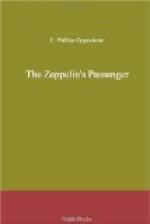Lessingham sat, his arms folded, his eyes fixed upon the fire. His thoughts were in a turmoil, yet one thing was hatefully clear. Cranston was not the unworthy slacker he had believed him to be. Philippa’s whole point of view might well be changed by this discovery—especially now that Cranston had made up his mind to assert himself for his wife’s sake. There was an icy fear in his heart.
“You understand,” Hayter persisted coldly, “what it is you have to do?”
“Perfectly. I shall return by the afternoon train,” was the despairing reply.
“If you succeed,” Hayter continued, “I shall see that you get the usual acknowledgment, but I will, if you wish it, ask for your transfer to another branch of the service. I am not questioning your patriotism or your honour, Maderstrom, but you are not the man for this work.”
“You are right,” Lessingham said. “I am not.”
“It is not my affair,” Hayter proceeded, “to enquire too closely into the means used by our agents in carrying out our designs. That I find you in London in company with the wife of the man whom you are appointed to watch, may be a fact capable of the most complete and satisfactory explanation. I ask no questions. I only remind you that your country, even though it be only your adopted country, demands from you, as from all others in her service, unswerving loyalty, a loyalty uninfluenced by the claims of personal sentiment, duty, or honour. Have I said enough?”
“You have said as much as it is wise for you to say,” Lessingham replied, his voice trembling with suppressed passion.
“That is all, then,” the other concluded. “You know where to send or bring the chart when you have it? If you bring it yourself, it is possible that something which you may regard as a reward, will be offered to you.”
Lessingham rose a little wearily to his feet. His farewell to Hayter was cold and lifeless.
He left the hotel and started on his homeward way, struggling with a sense of intolerable depression. The streets through which he passed were sombre and unlit.
A Zeppelin warning, a few hours before, had driven the people to their homes. There was not a chink of light to be seen anywhere. An intense and gloomy stillness seemed to brood over the deserted thoroughfares. Nightbirds on their way home flitted by like shadows. Policemen lurked in the shadows of the houses. The few vehicles left crawled about with insufficient lights. Even the warning horns of the taxicab men sounded furtive and repressed. Lessingham, as he marched stolidly along, felt curiously in sympathy with his environment. Hayter’s news brought him face to face with that inner problem which had so suddenly become the dominant factor in his life. For the first time he knew what love was. He felt the wonder of it, the far-reaching possibilities, the strange idealism called so unexpectedly into being. He recognized the vagaries of Philippa’s




